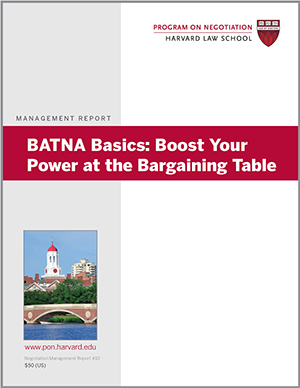
In negotiation, we are often confronted with the task of dealing with difficult negotiators, those people who seem to prefer to set up roadblocks rather than break down walls, or who choose to take hardline stances rather than seeking common ground with their counterparts. If you know your BATNA (best alternative to a negotiated agreement), you’ll have an easier time dealing with such people at the bargaining table.
One tactic you might consider is avoiding the conversation altogether by finding more collaborative negotiating partners to work with, but this is not always an option. When avoidance is impossible, strengthening your best alternative to a negotiated agreement (BATNA) can help give you the confidence you need to deal with obstinacy among difficult negotiating partners.
Preparing for a Negotiation: Knowing Your (and Your Counterpart’s) Best Alternative to a Negotiated Agreement
If you have a strong BATNA before beginning negotiations at the bargaining table, you’ll have the confidence to demonstrate the positives of collaboration, and you can more effectively head off opposition by knowing what direction you’ll take should talks fail. Finally, you can express your disapproval of your counterpart’s obstinate nature in an effort to coerce her into more productive negotiations.
The European Union took this latter approach with Russian president Vladimir Putin during an E.U.-Russia summit in late January 2014. Putin had fallen into disfavor with the European Union for the Kremlin’s policy toward Ukraine. In November 2013, Ukraine president Viktor Yanukovych canceled a broad trade and political agreement negotiated with the European Union.
The about-face had come in the wake of pressure from the Kremlin and the promise of a $15 billion loan and lower gas prices to Ukraine. Mass protests followed Yanukovych’s decision in Ukraine, leading to a tense standoff with the government.
Dealing with Difficult Negotiators at the Bargaining Table
Russia and Europe each blamed the other for interfering in Ukraine’s affairs. The Kremlin issued a report alleging human rights abuses in the European Union and criticized the attitudes of European governments toward homosexuality and same-sex marriage. Meanwhile, E.U. officials visited Kiev, Ukraine, to meet with government and opposition leaders.
A planned visit to Brussels, Belgium, for E.U. meetings by Putin was scaled back from two days to just three hours, and he was not offered the customary dinner typically offered to visit heads of state.
But the two sides did reportedly discuss the conflict in Ukraine, among other matters.
For business negotiators, the frosty relations between the two parties illustrates the challenges of dealing with difficult and powerful partners. In entering into a BATNA negotiation, the European Union may have been able to withhold dinner from Putin, but it recognized the value of keeping the Kremlin at the table.
Do you feel like you can manage difficult negotiators? Let us know in the comments.
Originally published in 2014.




